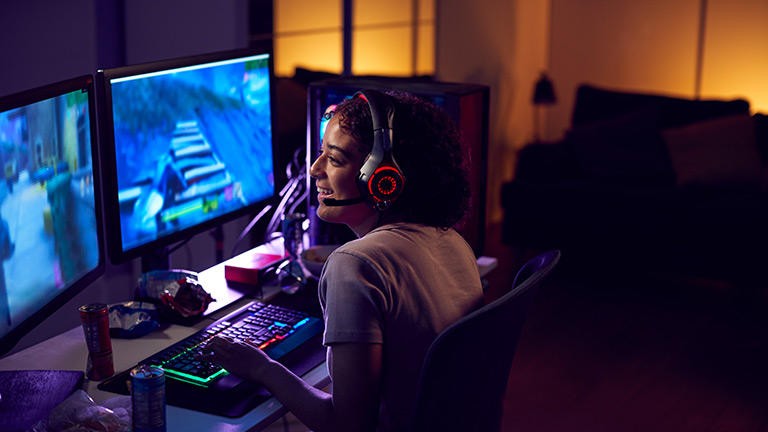The Psychology of Gaming: Why We Love to Play
Video games have evolved far beyond being simple pastimes. What once started with pixelated screens and basic mechanics has transformed into immersive worlds, complex narratives, and highly social experiences.
But the question remains: why do we love to play games so much? The answer lies in psychology. Human beings are naturally drawn to experiences that stimulate our brains, evoke emotions, and satisfy deep-seated needs. Gaming does all of that—often better than any other medium.
Escapism and Stress Relief

One of the primary reasons people play games is to escape from the pressures of everyday life. Work deadlines, personal struggles, and routine monotony can weigh heavily on us. Video games offer a virtual sanctuary, a place where players can temporarily step away from reality. Whether you’re exploring the magical lands of The Legend of Zelda or engaging in competitive matches of Valorant, games create a mental safe zone where stress is reduced, and enjoyment takes center stage.
Psychologists argue that this sense of escapism is not about ignoring real-life problems but rather about giving the brain a break. Just like a book or a movie provides immersion, gaming offers a more interactive form of relaxation, making it especially effective at stress relief.
The Reward System and Dopamine Rush
Gaming is deeply tied to the brain’s reward system. When players achieve something—whether it’s leveling up, unlocking rare loot, or defeating a tough boss—the brain releases dopamine, the “feel-good” neurotransmitter. This chemical reinforcement encourages players to keep engaging with the activity.
The beauty of games lies in their ability to provide frequent, measurable rewards. Unlike many real-life tasks that may take weeks or months to show results, games offer instant feedback. This sense of accomplishment is one of the strongest motivators for why players continue to return to their favorite titles.
Social Connections and Belonging
Contrary to the outdated stereotype of gamers being isolated, today’s gaming culture is highly social. Multiplayer games, voice chats, and online communities foster connections between people across the globe. From cooperative missions in Destiny 2 to massive eSports tournaments, gaming has become a shared experience.
Psychologically, this taps into our basic human need for belonging. Humans are social creatures, and games allow us to build friendships, collaborate toward goals, and even compete in healthy ways. The bonds formed in these virtual worlds often extend into real-life friendships, proving that games are powerful tools for connection.
The Appeal of Challenge and Mastery
Another core psychological aspect of gaming is the pursuit of mastery. Games provide structured challenges—whether solving puzzles, refining strategies, or honing reflexes. These challenges are carefully balanced to be difficult enough to spark engagement but not so overwhelming that they feel impossible.
This balance is often referred to as the “flow state,” where players are so deeply absorbed in a task that time seems to disappear. Achieving mastery in a game provides a sense of pride and personal growth, echoing the way humans have always strived to improve skills in various aspects of life.
Storytelling and Emotional Resonance

Modern games are more than just mechanics; they are storytelling platforms. Titles like The Last of Us or Red Dead Redemption 2 showcase emotional narratives that rival Hollywood films. Players don’t just watch characters go through experiences—they live them.
This interactivity creates deeper emotional connections. When a player makes decisions that shape a story’s outcome, the emotional weight feels personal. This level of involvement enhances empathy and provides memorable experiences that linger long after the game is turned off.
Identity and Self-Expression
Gaming also allows players to express themselves in ways they might not in everyday life. Creating avatars, choosing playstyles, or even role-playing within virtual worlds are ways for individuals to explore aspects of their identity. A shy person may become a bold warrior in an online role-playing game, while someone else might use games as a space to experiment with creativity, strategy, or leadership.
This freedom of expression fulfills psychological needs for autonomy and individuality, making games a meaningful medium for self-discovery.
Conclusion
The psychology of gaming reveals that our love for play goes far beyond entertainment. Games meet our needs for relaxation, achievement, connection, challenge, storytelling, and identity. They are interactive mirrors of human desires, offering both escape and empowerment in ways few other forms of media can.
As gaming continues to grow in scope and influence, understanding its psychological appeal becomes even more important. For deeper insights and trends in the gaming world, platforms like TechGarena.com provide valuable perspectives on how this ever-evolving industry continues to capture hearts and minds worldwide.





